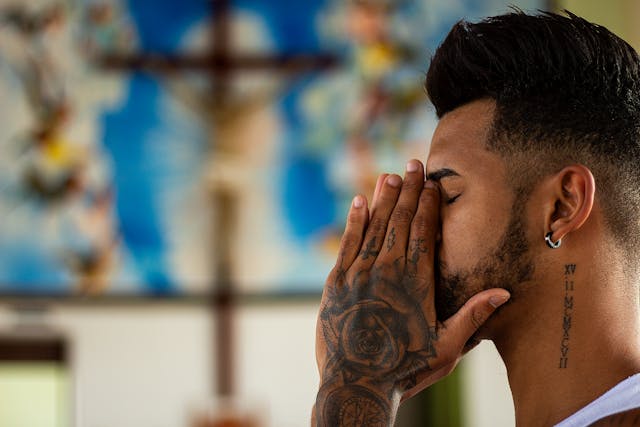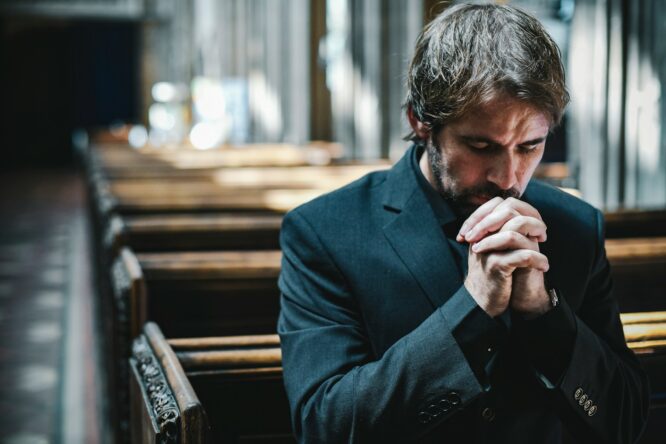When a church—or the people within it—lets you down, it can cut deep and really mess you up.

You might end up questioning not just the institution, but your entire relationship with faith, and that’s tough to get your head around. Whether it was through hypocrisy, exclusion, abuse of power, or subtle judgement, that kind of disillusionment doesn’t fade quickly. Still, many people feel a longing to reconnect with something bigger, even if they’re unsure where to begin. If that’s you, here are some straightforward ways to slowly, honestly rebuild your faith without rushing, forcing, or ignoring what you’ve been through.
1. Let yourself grieve the loss.

When a church community lets you down, it’s not just disappointment—it’s grief. You may be mourning trust, belonging, a former identity, or even the comfort of structure. That kind of loss deserves space, not spiritual bypassing. Give yourself permission to name what was taken or broken. The more honestly you can acknowledge what hurt, the more honestly you can begin to heal. Faith that denies grief rarely grows; faith that includes it often deepens.
2. Separate God from the institution.

It’s easy to confuse church leadership or culture with the nature of God, especially if you grew up being told they were one and the same. The thing is, humans are fallible, and institutions—even well-meaning ones—can cause harm. Try asking: if I remove the institution, what do I still believe about the divine, about love, about meaning? This gentle detangling is often the first step toward reclaiming a faith that actually feels true to you.
3. Take a break without shame.

You don’t owe anyone an explanation for stepping back. Taking time away from church doesn’t mean you’ve failed spiritually—it means you’re being honest about your needs. Healing requires space, not performance. If attending services feels triggering, exhausting, or hollow right now, honour that. Faith isn’t measured by church attendance—it’s shaped by the quiet, personal choices you make when no one’s watching.
4. Reconnect with the parts of faith that still feel alive.

You may not feel connected to sermons or rituals anymore, but there might still be verses, songs, prayers, or concepts that bring you peace. Revisit them slowly. See what still resonates without forcing anything to land. Sometimes a single line, a melody, or an old memory can reopen a doorway to something gentle and real. Even the smallest flicker is worth honouring—it’s a starting point, not a pressure point.
5. Find safe people to process with.

Rebuilding faith can feel isolating, especially if other people expect you to “move on” or “just pray through it.” Surrounding yourself with people who get it—whether through a friend, a support group, or an online space—can be incredibly grounding. Look for people who won’t rush to defend the church or minimise your experience. Safe faith conversations happen when there’s room for doubt, nuance, and honest questions without judgement.
6. Let your doubts be part of the process.

You don’t need to have clear answers to move forward. Doubt is not a flaw in your faith—it’s part of it. Asking questions, challenging teachings, and exploring other perspectives is how deeper belief often takes shape. If your previous church made doubt feel dangerous or rebellious, this step can feel uncomfortable. However, making room for questions is how you start to build something grounded in personal truth, not borrowed certainty.
7. Read sacred texts with fresh eyes.
 Source: Unsplash
Source: Unsplash If scripture feels triggering, it’s okay to pause. But when you’re ready, try revisiting it outside the lens of rigid doctrine. Read slowly, reflectively, and allow yourself to wrestle with it without needing to interpret it exactly as you were taught. Sometimes returning to sacred texts with a softer mindset—without the pressure to find the “right” meaning—can bring unexpected moments of clarity, connection, or even healing.
8. Explore other spiritual voices.

There’s no rule that says your growth can only come from one denomination or tradition. Sometimes hearing from people outside your original faith framework can offer new perspectives that actually deepen what you believe. You might find comfort in contemplative writers, social justice-oriented theologians, poets, or even other faiths. You don’t have to adopt everything they say—but their language might put words to the things you’ve been sensing all along.
9. Rebuild your spiritual practices on your terms.

What once felt nourishing may now feel hollow. That’s okay. Instead of forcing old routines, try creating new ones that reflect where you are now. Maybe it’s lighting a candle at night, writing short prayers, or simply being present in nature. The practice doesn’t have to look religious to be spiritual. What matters is that it connects you to something quiet, meaningful, and honest. Your rituals are allowed to evolve as you do.
10. Don’t rush to find a new church.

When you’ve been hurt, there’s often pressure to “just find a better church.” But healing doesn’t work on someone else’s timeline. You’re allowed to be cautious. You’re allowed to not be ready, and you’re allowed to take your time. If and when you do explore a new spiritual community, take note of how you feel in your body. Do you feel safer, calmer, more seen—or more guarded and wary? Your intuition matters here more than anything else.
11. Learn to trust your spiritual instincts again.
 Source: Unsplash
Source: Unsplash If your trust was broken by people who claimed to speak for God, it can make you question your own inner voice. Rebuilding that trust takes time, but it starts with noticing what brings peace, what makes you feel small, and what sparks quiet joy. Start asking: Does this make me feel more connected to love? To truth? To myself? That soft internal compass is still there—it may have just been buried under other people’s expectations.
12. Let forgiveness be a choice, not a requirement.

You don’t have to forgive quickly. You don’t have to forgive at all to move forward. Forgiveness is powerful—but only when it’s chosen freely, not demanded by those who want you to let it go for their comfort. Start with validation. What happened to you mattered. You get to name it without needing to rush to reconciliation. Healing and forgiveness aren’t the same thing, and both happen on your own terms.
13. Focus on rebuilding trust before rebuilding belief.

Before you worry about what you believe, focus on who and what you can trust. Trust in your voice. Trust in the small rituals that feel safe. Trust in the parts of faith that still resonate, even if it’s just one thread at a time. When trust begins to regrow, belief often follows—not as a doctrine to adopt, but as something deeper and more lived-in. Let trust lead the way, and let belief find its form slowly and honestly.
14. Redefine what faith means to you now.

Faith doesn’t have to mean blind belief or rigid certainty. It can mean trusting that love is still real. That healing is possible. That mystery is worth leaning into, even when you don’t have a name for it yet. You get to redefine what spirituality looks like for you now. It doesn’t have to match what you were taught. What matters is that it feels like home, not like something you have to perform to be accepted.
15. Know that you’re not alone in this.

So many people are quietly rebuilding their relationship with faith after being hurt by the structures that claimed to protect it. You are not weak. You are not lost. You are not alone in this process, even if it feels isolating at times. Healing your faith is not about going backward—it’s about becoming more honest, more anchored, and more free. And there’s nothing more spiritual than that.




